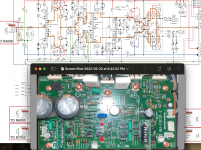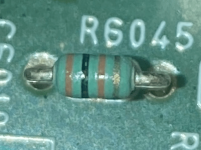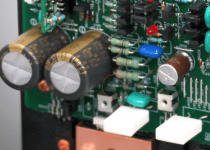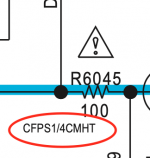Hello folks,
I have a Marantz PM-11S3 that was purchased for parts with a bad right channel. I managed to turn on the amp to verify the left channel amp stage is working by measuring a 15mV idling voltage before the protection circuit puts the amp into standby mode. The right channel idling voltage was a whopping 9V before the protection circuit kicked in! I'm focusing on repairing the right channel amp stage. I am using the left channel amp stage and service manual as guidelines. So far I've found 7 resistors that were burnt, out of tolerance, the wrong resistor value, or in the case of R7053, broken (open). The back (foil side) of the right channel amp stage board reveals most of those resistors were replaced in a previous repair attempt, except for R7053. It is puzzling that some were replaced with the wrong resistor values. My plan is to replace all the resistors circled in red, and see what happens.
I have verified the driver and output transistors on the heatsink pass the diode tests (diode tests across BC and BE). I realize these Sanken devices are no longer manufactured and difficult to find, but for the moment I'm working under the assumption they are undamaged.
My question is in regards to film resistors that have been notated at "critical". Should I follow what's written in the service manual or what was actually manufactured?
The service manual clearly states:
"WARNING:
Parts indicated by the ! (in a triangle) mark have critical characteristics. Use ONLY replacement parts recommended by the manufacturer."
For example, on the working left channel R6045: The schematic calls for CFPS1/4CMHT, which is a carbon film flame-retardant resistor. In the photo, R6045 appears to be a metal film resistor based on carbon = orange/brown metal = green/blue. Also, I found a stock photo, compliments of Crutchfield, which shows what appears to be a metal film resistor.
Should I follow guidelines in the schematic or the manufactured part? Or are these actually carbon film resistors in blue/green?
As it turns out I purchased metal film resistors (eg MBA02040C2200FCT00) with slightly higher 400mW power rating before discovering this potential mistake. I purchased the exact match for R7053.
Any help is appreciated.
I have a Marantz PM-11S3 that was purchased for parts with a bad right channel. I managed to turn on the amp to verify the left channel amp stage is working by measuring a 15mV idling voltage before the protection circuit puts the amp into standby mode. The right channel idling voltage was a whopping 9V before the protection circuit kicked in! I'm focusing on repairing the right channel amp stage. I am using the left channel amp stage and service manual as guidelines. So far I've found 7 resistors that were burnt, out of tolerance, the wrong resistor value, or in the case of R7053, broken (open). The back (foil side) of the right channel amp stage board reveals most of those resistors were replaced in a previous repair attempt, except for R7053. It is puzzling that some were replaced with the wrong resistor values. My plan is to replace all the resistors circled in red, and see what happens.
I have verified the driver and output transistors on the heatsink pass the diode tests (diode tests across BC and BE). I realize these Sanken devices are no longer manufactured and difficult to find, but for the moment I'm working under the assumption they are undamaged.
My question is in regards to film resistors that have been notated at "critical". Should I follow what's written in the service manual or what was actually manufactured?
The service manual clearly states:
"WARNING:
Parts indicated by the ! (in a triangle) mark have critical characteristics. Use ONLY replacement parts recommended by the manufacturer."
For example, on the working left channel R6045: The schematic calls for CFPS1/4CMHT, which is a carbon film flame-retardant resistor. In the photo, R6045 appears to be a metal film resistor based on carbon = orange/brown metal = green/blue. Also, I found a stock photo, compliments of Crutchfield, which shows what appears to be a metal film resistor.
Should I follow guidelines in the schematic or the manufactured part? Or are these actually carbon film resistors in blue/green?
As it turns out I purchased metal film resistors (eg MBA02040C2200FCT00) with slightly higher 400mW power rating before discovering this potential mistake. I purchased the exact match for R7053.
Any help is appreciated.
Attachments
-
 Screen Shot 2022-05-23 at 11.28.06 AM.png1,021 KB · Views: 443
Screen Shot 2022-05-23 at 11.28.06 AM.png1,021 KB · Views: 443 -
 Screen Shot 2022-05-22 at 8.45.36 PM.png878.2 KB · Views: 437
Screen Shot 2022-05-22 at 8.45.36 PM.png878.2 KB · Views: 437 -
 Screen Shot 2022-05-23 at 11.35.34 AM.png114.1 KB · Views: 310
Screen Shot 2022-05-23 at 11.35.34 AM.png114.1 KB · Views: 310 -
 Screen Shot 2022-05-23 at 11.58.32 AM.png713.7 KB · Views: 253
Screen Shot 2022-05-23 at 11.58.32 AM.png713.7 KB · Views: 253 -
 Screen Shot 2022-05-23 at 11.45.47 AM.png8.5 KB · Views: 252
Screen Shot 2022-05-23 at 11.45.47 AM.png8.5 KB · Views: 252
Last edited:
Usually that means flameproof or flame retardant resistors. But it's difficult to tell from their appearance.
You should use only parts as specified by the mfr, including the power ratings.
The previous damage to the pcb may have been due to use of wrong parts.
You should use only parts as specified by the mfr, including the power ratings.
The previous damage to the pcb may have been due to use of wrong parts.
Yes, those are flame proof resistors. Unfortunately, I haven't found the whole lot in stock under that manufacturer KOA Speer (CFPS1/4CMHT)Usually that means flameproof or flame retardant resistors. But it's difficult to tell from their appearance.
You should use only parts as specified by the mfr, including the power ratings.
The previous damage to the pcb may have been due to use of wrong parts.
. But I can follow the same parameters: Flame retardant or proof?, 5% tolerance, 1/4Watt, and size. Would you recommend, is there a difference between metal or carbon film resistors under the above parameters? I noticed the metal film resistors have a much better temperature coefficient. Or does it matter if I use carbon or metal film resistors as long as they are flame retardant and rated at 1/4Watts? Thanks
Last edited:
Because of the condition of the unit from the previous failure, I'd rather not make any suggestions
for parts substitutions, since the next failure could be even worse. You shouldn't change the power ratings
for the replacement parts, since that is part of the safety design. It's also possible that there is
a subsequent service bulletin for this unit that changes recommendations for some parts.
for parts substitutions, since the next failure could be even worse. You shouldn't change the power ratings
for the replacement parts, since that is part of the safety design. It's also possible that there is
a subsequent service bulletin for this unit that changes recommendations for some parts.
No luck with finding bulletins. I wouldn't hold you to anything lol. Per your advice, I am following the parameters listed in service manual: 1/4Watts, 5% tolerance and flame proof. I'm pretty sure those parameters are not specific to a manufacturer, in this case KOA Speer which are out of stock. I guess my question is does it matter if I select metal or carbon film resistors as long as they fit those those parameters?Because of the condition of the unit from the previous failure, I'd rather not make any suggestions
for parts substitutions, since the next failure could be even worse. You shouldn't change the power ratings
for the replacement parts, since that is part of the safety design. It's also possible that there is
a subsequent service bulletin for this unit that changes recommendations for some parts.
Metal film, though better in general, can and will fail differently from carbon film. This is why they say no subs.
More precise can mean more fragile. Once you start changing parts from spec, things are in unknown territory,
since no durability testing has been done. This is why the space program often uses much older technology,
because such parts have a better documented long term record.
More precise can mean more fragile. Once you start changing parts from spec, things are in unknown territory,
since no durability testing has been done. This is why the space program often uses much older technology,
because such parts have a better documented long term record.
I see. Thanks for the insight. I found this note as well which seems to apply to the critical resistors in this amp stage.
https://www.repairfaq.org/samnew/tvfaq/tvflamepr.htm
https://www.repairfaq.org/samnew/tvfaq/tvflamepr.htm
The marantz service manual match the amplifier. I have one. Remember those resistors fail for a reason. Doble check all parts with a meter before change parts. If you have skill try to test the VAS isolated from output to avoid more damages.
Ok thanks that information. This is more reason to triple check everything before pushing the power button. I don't think I have the equipment to isolate the VAS. I think I would need a separate voltage and/or amp supply for that.
I clearly need to do some more research.
Last edited:
But I'm going to email the resistor manufacturer: KOA Speer for confirmation that R6045 matches CFPS1/4CMHT.
But I'm going to email the resistor manufacturer: KOA Speer for confirmation that R6045 matches CFPS1/4CMHT.
Just remember, rushing things always takes longer.
True, and sometimes forever.Just remember, rushing things always takes longer.
Now to add another possible twist, as it turns out the metal film resistors I purchased have two power rating modes: 250mWatt at Standard mode, and 400mW at Power mode.
https://www.mouser.com/datasheet/2/427/VISH_S_A0005972005_1-2569743.pdf
https://www.mouser.com/datasheet/2/427/VISH_S_A0005972005_1-2569743.pdf
How do you know the resistor in the photo (R6045) is KOA Speer CFPS1/4? That's what I'm trying to find out. I haven't found one example of a Carbon Film resistor in green/blue. All seem to be orange/brown or a rusty red.Yes they are KOA Speer CFPS1/4. CMHT is just the form of the leads. Mouser have CFPS resistors in stock
Last edited:
I ordered from Mouser few years ago, to repair failed Marantz PM11 🙂How do you know the resistor in the photo is KOA Speer CFPS1/4?
Ha, ok thats the ticket! thanks 🙂 . Mouser only has 47 and 470ohm in stock. I'm trying to find 47, 100, 180, 220 and 470ohm in stock. Would you recommend these Stackpole resistors from Digikey as possible substitutes? They are flame retardant and so far the only one I can find in stock.Example -CFM14JA180RI ordered from Mouser few years ago, to repair failed Marantz PM11 🙂
https://www.seielect.com/catalog/sei-cf_cfm.pdf
If I understand correctly the purpose of these resistors is to fail a certain way to prevent damage to other components, correct?
Last edited:
The purpose is to protect the output and driver devices. This is why higher power resistors are not the best for that position. I think, that any flameproof 1/4W carbon film will fit in that location.Ha, ok thats the ticket! thanks 🙂 . Mouser only has 47 and 470ohm in stock. I'm trying to find 47, 100, 180, 220 and 470ohm in stock. Would you recommend these Stackpole resistors from Digikey as possible substitutes? They are flame retardant and so far the only one I can find in stock.Example -CFM14JA180R
https://www.seielect.com/catalog/sei-cf_cfm.pdf
If I understand correctly the purpose of these resistors is to fail a certain way to prevent damage to other components, correct?
I see. So far the closet match I can find are flame retardant 1/4 Carbon film resistors, and according to the Stackpole datasheet "flame retardant" has slightly (-20%) lower thresholds than "flame proof". Appreciate the help.The purpose is to protect the output and driver devices. This is why higher power resistors are not the best for that position. I think, that any flameproof 1/4W carbon film will fit in that location.
- Home
- Amplifiers
- Solid State
- Marantz PM-11S3: Replacing components: Should I follow the service manual or what is manufactured?